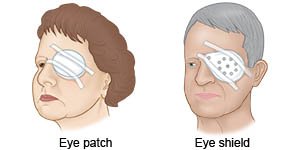Diplopia
Medically reviewed by Drugs.com. Last updated on Apr 6, 2025.
What is diplopia?
Diplopia is double vision in one or both eyes. Diplopia may be caused by eye problems, eye surgery, or health conditions such as Graves disease or Parkinson disease. The cause of your diplopia may not be known.
How is diplopia diagnosed?
Your healthcare provider will examine your eyes to check their position, vision, and movement. He or she will ask questions about the images you see.
How is diplopia treated?
- Contacts or corrective lenses may be prescribed, or your current prescription may need to be updated.
- A prism may be used to help your eye focus correctly. A prism is a wedge-shaped piece of glass or plastic that sticks onto an eyeglass lens.
- An eye patch or eye shield may be used for a short time.

- Optical blurring is used to block your vision enough to remove the second image you see. Your provider blurs the eyeglass lens of your affected eye.
- Surgery may be needed if other treatments do not work.
How can I manage my diplopia?
- Do not drive until you know how the eye patch, prism, or other treatments affect you. Ask your provider for more information.
- Manage any health condition that may be causing or worsening your diplopia. Take your medicine for the condition as directed.
When should I contact my healthcare provider?
- Your vision worsens or does not improve, even after treatment.
- You have questions or concerns about your condition or care.
Care Agreement
You have the right to help plan your care. Learn about your health condition and how it may be treated. Discuss treatment options with your healthcare providers to decide what care you want to receive. You always have the right to refuse treatment. The above information is an educational aid only. It is not intended as medical advice for individual conditions or treatments. Talk to your doctor, nurse or pharmacist before following any medical regimen to see if it is safe and effective for you.© Copyright Merative 2025 Information is for End User's use only and may not be sold, redistributed or otherwise used for commercial purposes.
Further information
Always consult your healthcare provider to ensure the information displayed on this page applies to your personal circumstances.
